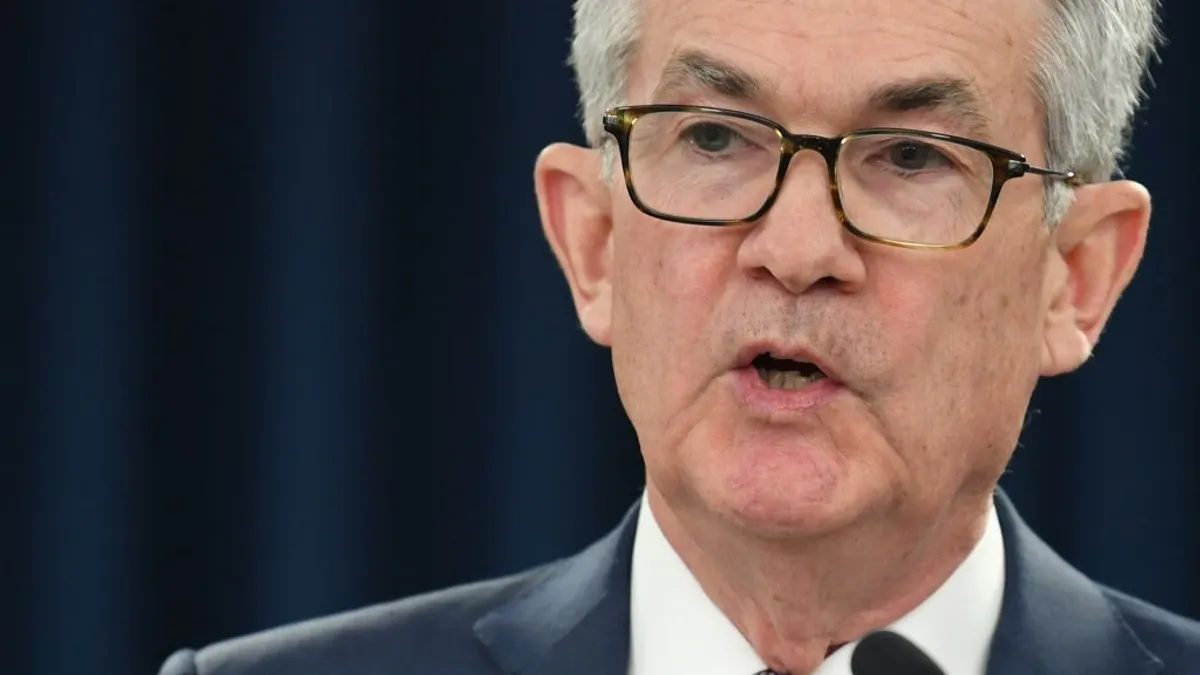CFOs who have navigated their companies through a once-in-a-century pandemic can find some comfort in the aphorism, "what does not kill me makes me stronger."
The onset of COVID-19 a year ago brought severe financial market turbulence, the sharpest recession on record, employee hardship and, for some CFOs, many sleepless nights. While confronting the challenges, financial executives gained valuable insights into a broad range of their responsibilities — from strategy and treasury to internal audit and risk management.
With the pandemic persisting into a second year, we've identified four lessons learned by CFOs that can help them outperform in post-coronavirus markets and better handle the next crisis.
1. Ensure business continuity with forward-looking risk management
Even before the coronavirus outbreak, financial executives faced a rising number of external threats — cyberattacks, extreme weather, political instability and tariff wars to name a few.
Their risk dashboards lit up when the coronavirus struck and shattered standard crisis planning, exposing flaws in emergency safeguards for employees, customers, assets, facilities and supply chains.
"No one's scenario planning had COVID-19," Freshly CFO Matt Hagel said. "This is not something you could put in an Excel spreadsheet."
Record monetary and fiscal stimulus brought short-term stability but raised the prospect of long-term financial imbalances such as inflation and crushing federal debt. The upshot: CFOs today face the broadest range of external risks in decades.
"The fog of the situation can be really impenetrable, so having visibility into the data, digitized plans for what you’ll do under certain situations will help you plan end-to-end and take action."

Patrick Brickley
CFO, Everbridge
"The pandemic has helped people realize the value of being more proactive and nimble in scenario planning, and how easy it is to get paralyzed" in a crisis, according to Patrick Brickley, CFO at Everbridge, a provider of enterprise software for planning and automating crisis response.
Many CFOs build scenario planning from the top-down, often based on insights from a limited team, Brickley said.
"We've flipped that and said, ‘What's the worst that can happen'" to customers, employees, shareholders and company financials?'" Brickley said. "‘Let's have really clear eyes on that and build up from there,'" working with a team from across a company.
A challenge for CFOs is measuring the full range of risks and filtering the ocean of available information, Brickley said.
"There's much more noise to sift through, so having a clear line of sight into all these potential forms of disruption, and clear plans in place to deal with them helps you become that much more effective," he said.
Highly detailed, real-time data is especially revealing and helpful in creating a finely tuned crisis response, Brickley said. "It's not necessarily useful to know that something is going on in greater Chicago," he said. "It's better to know that something's happening on your block."
For example, a retailer or mall owner can correlate various kinds of potential disruption with information on employees, facilities, inventory and competitors to predict what might happen during a crisis.
When a shock occurs, software automation can quickly send emails and other notifications, beginning a rapid, coordinated response.
"Waiting for people to think stuff through, do calculations, send emails, read emails, make phone calls, check voice mails — that can grind response to a halt, especially when you are working across silos and across geographies," Brickley said.
"The fog of the situation can be really impenetrable, so having visibility into the data, digitized plans for what you'll do under certain situations will help you plan end-to-end and take action," he said.
Supermarkets, pharmacies and other retailers using such systems gauged the impact of COVID-19 and local health regulations on stores spread across several regions. Using real-time information, they restocked inventory, informed customers about store status, determined when to withdraw or mobilize employees and began planning for a post-pandemic rebound.
Reliance on customer data and analytics during the pandemic has proven vital to Freshly, Hagel said. The direct-to-consumer company — bought by Nestlé in October for $950 million — delivers more than 1 million prepared meals each week to subscribers in 48 states.
By analyzing online orders, Freshly can immediately track meal preferences and calibrate supplies, inventory and distribution. Real-time data helped Freshly limit disruption from the winter storms and blackout in Texas, Hagel said. "We've always said we're a tech company."
At Global Upside, a provider of professional services such as accounting and human resources, the coronavirus forced an abrupt shutdown of its office for more than 300 employees in Noida, India.
"Overnight we had to shift to work from home," Global Upside CFO Roy Avondet said.
Acting on an emergency plan, the company bought hundreds of laptops and wi-fi hotspot devices. "We pulled it off and didn't have any hiccups in our service delivery," Avondet said.
When put to the test, however, even crisis management with comprehensive planning or the sharpest technology might show flaws.
For example, some companies learned during the pandemic that they lacked sufficient supply chain backup, according to Loren Garruto, global and Americas corporate finance leader at EY. Freshly recognized that it needs to more frequently review its inventory and supply chains, Hagel said.
Consultants who pushed for lean supply chains and just-in-time inventory "may be eating their words," Garruto said. "You're hearing more talk of redundant supply chains and additional crisis levels of inventory, so it's a different world."
The importance of nimble supply chains is just one illustration of how savvy crisis management depends on flexibility.
"Just about every plan is wrong — it's incomplete in one way, so you learn as you go," Brickely said. "To be able to see where the plan needs to be changed in real time and be able to make that change in the software and push that out to all constituents in real time is critical."
Successful crisis management also hinges on clear, detailed communication to employees, customers, investors and other stakeholders, he said. "Uncertainty can paralyze people, and productivity can go way down."
"The goal is to eliminate paralysis, and sometimes you can do that by saying, ‘Hey, we don't know but here's what we're doing to try to figure it out, and here's when we'll get back to you," Brickley said. "If you're providing very conservative guidance that was better than just leaving shareholders guessing."
Some conservatism may be wise, given how the coronavirus has underscored to CFOs the extreme range and unpredictability of risks.
"COVID is one thing, but now we're hit by storms" in Texas and other parts of the U.S., Hagel said, adding "I saw it was snowing in Santa Monica."
2. Streamline internal audit
By scattering staff from offices to remote work, the coronavirus revealed weaknesses in the manual, 20th-century approach to controls and internal audit still used to some extent by companies of all sizes, according to experts in internal audit.
Abuses soared in some spending categories, according to data from Oversight Systems, a provider of software for detecting vendor and employee fraud and reducing spending risk.
Travel and entertainment spending plunged 55% in 2020 compared with 2019, but the violation rate surged 292%, Oversight Systems found in an analysis of spending by more than 200 of its clients.
Spending for remote work rocketed seven times compared with 2019 in two "high-risk" categories: miscellaneous stores and mail/phone order. Staff setting up in-home offices charged employers for big screen TVs, soundbars — even a rifle silencer, Oversight Systems said.
Out-of-pocket spending has declined since the fourth quarter of 2020 but is still extremely high compared to pre-pandemic levels, the company said. "Organizations should continue to closely monitor this activity as it accounted for more than 17% of spend violations during 2020."

Among the top five violations last year were spending on gift cards sold by grocery stores and restaurants that rely on delivery services such as DoorDash and Uber Eats, Oversight Systems said.
Amazon took in more than 70% of spending on bookstores, Oversight Systems said. "Because this retailer sells everything from electronics to prefabricated homes, the risk of out-of-policy spend is high."
Fraudsters took advantage of the disarray as companies rushed to help employees build in-home offices, Oversight Systems CEO Terrence McCrossan said. Staff fearing a pink slip, or living with someone who was recently laid off, were more inclined to file false expense reports.
Cases of fraud also rose in accounts payable, McCrossan said. Some employees masqueraded as vendors and processed payments to themselves. Bogus vendors bilked companies through phishing scams.
With staff newly shifted to remote work, "companies that didn't have spending management tools were more likely to fall for a phishing expedition," Emburse CFO Katherine Edenbach said.
In such a scheme an employee receives an invoice "and the vendor is hammering them for payment and they're not quite sure what to do with it or who to route it to and who is supposed to have approved it and whether it's in budget or out of budget and so it just ends up getting paid," she said. Emburse provides software for managing expenses and accounts payable.
Many companies relaxed spending oversight while rushing to shut down offices and provide staff with laptops and internet access, McCrossan said. "A lot of companies suspended internal audit processes to enable their finance teams and shared service teams to perform their job function."
While companies have restored their pre-pandemic internal audit, many of their systems are still fragmented in siloed data sets and use manual business intelligence tools such as Excel, McCrossan said. Companies using outdated systems are often "data rich but information poor."
"Mental health is extremely important” and often hard to maintain for employees who struggle to disconnect from work when under lockdown at home. "Take the day off or take the week off because we’re all humans and our brains need it."

Matt Hagel
CFO, Freshly
For example, many company service teams eyeball a sample of just 10% to 15% of expense reports one by one, looking for a pattern of violations that may pervade the company, McCrossan said. "It's extraordinarily inefficient and inaccurate."
Some companies during the pandemic have sped up their digital transformation and automated internal audits, using artificial intelligence to more effectively find violations across all spending, but especially among high-dollar, high-risk expenses, he said.
Before 2020 "most finance teams were moving toward more of a virtual or digital operation," Edenbach said.
"The pandemic kicked everyone over there," she said. They can "better manage their operations, manage cash and gain better visibility into what was happening in a decentralized environment."
3. Safeguard access to diversified sources of capital
Shock from the coronavirus outbreak a year ago prompted a "dash for cash" by CFOs that was far from the exuberant, game-show antics that the rhyme implies.
Short-term funding markets reeled. Redemptions from institutional prime money market funds in mid-March 2020 surged 30%, a faster outflow than during the 2008 financial crisis, Federal Reserve Governor Lael Brainard said.
The rush for liquidity even jolted the market for Treasury securities, which many companies and investors consider risk free.
The Fed quickly stabilized debt markets and pumped record stimulus into the economy. Still, cash held by U.S. non-financial companies stood at a record $2.12 trillion in June, a 30% increase from the end of 2019, Moody's Investors Service said.
Jarred by the market turmoil last spring, many companies have resolved to hold higher levels of cash for the foreseeable future, according to CFOs and finance consultants. "It's really important to build cash reserves," Avondet said.
"You'll see a lot of corporate balance sheets getting beefed up," Hagel said, adding that Freshly has increased its cash cushion from 12-to-18 months to at least two years.
Referring to "rainy day funds," Hagel said he is eyeing cryptocurrency. "The rise of cryptocurrency has given us something to think about."
Many CFOs have met with their treasury and financial planning group to identify levers to pull when another crisis strikes, Garruto said.
"The big word that I hear is agility — being able to move quickly" and follow a "crisis playbook," she said. Many CFOs whose supply chains were strained during the pandemic are monitoring their suppliers' cash levels and weighing whether to provide support or buy them outright.
Companies have raised cash by drawing on lines of credit or selling debt, taking advantage of low interest rates, she said. Or they have divested non-core assets such as railway spurs, co-generation plants or port assets.
Companies with weak balance sheets are seeking capital from private equity firms and exploring partnerships with peer companies. They are also considering joint ventures with firms in an adjacent sector or linking up with a special purpose acquisition company (SPAC), Garruto said.
Cruise lines, resorts and theme parks are especially hungry for capital, she said. After the pandemic "there's going to be a lot of pent-up demand and they want to be the winners."
Like many companies, Emburse and Freshly last spring drew down lines of credit, Edenbach and Hagel said.
Emburse tightened cash management in response to a slowdown in customer payments, and shifted from quarterly to monthly forecast, Edenbach said.
Raising capital and using it wisely are very different challenges, the CFOs and financial consultants said.
One year into the coronavirus crisis, 56% of CFOs say that they need to completely overhaul their capital allocation strategy, with only 47% saying their approach to dispensing capital meets shareholder return goals, EY found in a survey.
More than two-thirds of CFOs plan to rebalance their portfolios to focus on core business, and 62% plan to speed up digital transformation, according to the survey of 1,050 financial executives in nine countries.
CFOs will likely spend more on IT in 2021 than ever in response to forecasts that vaccinations will clear the way for strong economic growth.
IT spending worldwide will surge 6.2% this year to a record $3.92 trillion as CFOs speed up their pre-pandemic plans for digital transformation by at least five years, according to Gartner.
Yet with all their reordering of priorities and unprecedented spending, only 8% of CFOs review the performance of their investments, Garruto said, citing the survey.
"Nobody's learning from past mistakes or figuring out how they could even course correct," she said. "They're making decisions and just living with the consequences."
4. Promote employee well-being
Office shutdowns and the rush to remote work blurred the boundary for employees between work and the rest of their lives.
Suddenly, workers faced the stress of constructing home offices, home schooling children, virtual-only meetings with customers and colleagues, caring for sick family members or, for those living alone, weeks of isolation.
Eighty-four percent of CFOs believe their company is successfully sustaining employee morale and mental health, according to a PwC survey. Their employees believe their bosses could do better.
Only 31% of employees strongly agree that their company is addressing their mental health and overall well-being. Many workers need support. One in four respondents to another PwC survey said that during the pandemic their mental and physical health has gotten somewhat or much worse.
Many chief human resource officers have gotten the message. Eighty-four percent of them plan to launch more programs to support mental health, PwC said.
Despite the strains of the past year, most employees find that the convenience of remote work outweighs the advantages of the office. After concerns about the coronavirus wane, 55% of employees would prefer to work remotely at least three days each week, according to PwC.
"The workforce has changed forever," requiring companies to enable greater mobility and help employees work more effectively outside the office, Avondet said.
The stakes are high for CFOs trying to meet employee needs and preferences, including finding the best balance between office and remote work, financial executives said.
Success in attracting and holding onto talent will partly hinge on how well companies shape an employee-friendly, post-pandemic workplace, they said.
"The ultimate proof point will be retention of employees," McCrossan said.
During the pandemic Global Upside has enabled staff to connect by sharing progress in physical fitness and virtual classes in yoga, cooking, novel writing and other skills, Avondet said.
Global Upside also "created a lot of opportunities for employees to voice their ideas on how to do things differently, how we could adapt, how to help them be more effective from their work environment," he said. "We are going to be expanding that idea of hearing more from our employees."
Emburse started virtual "coffee chats" during which the CEO and other company leaders discuss plans and performance, Edenbach said. A virtual Emburse band occasionally performs during the meetings.
Emburse created a "virtual water cooler" in Slack, where employees share videos and ideas, Edenbach said. It also occasionally offers "unplugged days," when the company shuts down and everyone takes a day off.
"Mental health is extremely important" and often hard to maintain for employees who struggle to disconnect from work when under lockdown at home, Hagel said. He encourages his managers to tell stressed employees to "take the day off or take the week off because we're all humans and our brains need it."
At many companies during the pandemic "there was an incredible amount of focus put on employee wellness and employee health," McCrossan said. "That will continue to be a driving concern and help shape a company's strategy."



















